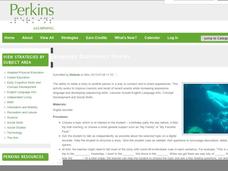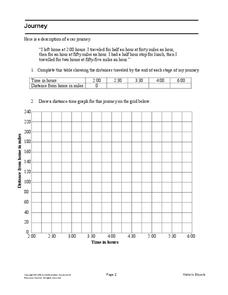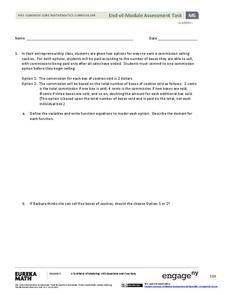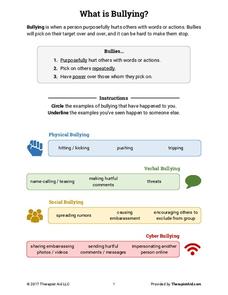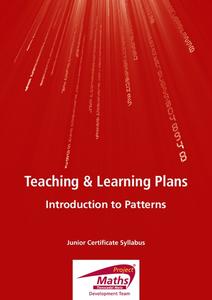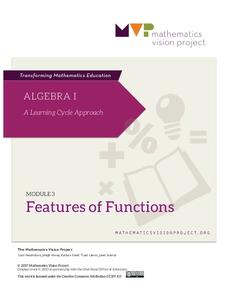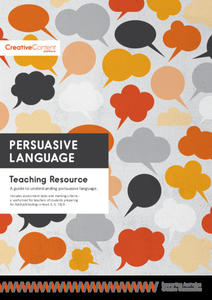Perkins School for the Blind
Put the Shoe on Your Foot
Promote clothing identification, body part identification, and dressing skills acquisition with a fun and lively game. Each child takes turns grabbing a clothing item from the central clothing box. As he puts the item on, he sings,...
Association for Supervision and Curriculum Development (ASCD)
Interpreting Algebraic Expressions
The title of this lesson should be "Algebraic Expressions Four Ways." Not only will your class be translating verbal descriptions of algebraic expressions to symbols, but also working with their geometric interpretation via area as well...
Illustrative Mathematics
Guess My Number
Make a game out of solving equations. This particular activity works well for pairs of learners. Follow the instructions to have player one pick a number and player two verbally give an equation. Participants need to make sense of a...
Perkins School for the Blind
Language Experience Stories
Here is a great way to bring core content to your special education classroom. Included is a set of instructional ideas intended to help learners increase their verbal and written expression through storytelling. Tape recorders, story...
Tobii Dynavox
Sono Flex
Empower nonverbal learners with the gift of gab using this speech and language application. Offering hundreds of picture-supported words and phrases, it's easy for students who struggle with verbal communication to have meaningful...
Do2Learn
Social: Behavior
What does "good behavior" look like? Set clear guidelines for what type of behavior is expected in different situations, and ensure your learners understand the verbal cues that you provide.
Positively Autism
"Trick or Treat" Cards
Perfect for non-verbal learners, these Trick or Treat cards say thanks in a big way. Children with autism can hand this Happy Halloween thank you card to houses visited or can wear a big copy attached to their costume.
Hampton-Brown
From "First Crossing"
Young scholars look closely at four tales taken from the collection of short stories, First Crossing edited by Donald R. Galloby. While examining the life of four teenagers and the lives they lead as U.S. immigrants,...
Mathematics Assessment Project
Journey
Drive home math concepts with an engaging task. Learners follow a verbal description to fill in a table and create a distance-time graph representing a car journey. They then answer questions by interpreting the graph.
Mathematics Assessment Project
Circle Pattern
Cool circle patterns! To investigate patterns of shading in circles, learners use the values for specific examples of the pattern to generate a verbal rule for the arrangement.
Mathematics Assessment Project
Sorting Functions
There's no sorting hat here. A high school assessment task prompts learners to analyze different types of functions. They investigate graphs, equations, tables, and verbal rules for four different functions.
EngageNY
End-of-Module Assessment Task - Algebra 1 (Module 5)
This unit assessment covers the modeling process with linear, quadratic, exponential, and absolute value functions. The modeling is represented as verbal descriptions, tables, graphs, and algebraic expressions.
Therapist Aid
What is Bullying?
What is the definition of bullying, and how can you deal with it? Elementary and middle schoolers discuss verbal, physical, social, and cyberbullying before talking about strategies to avoid and stop bullying in their school.
Scholastic
Tell Us a Tale: Teaching Students to Be Storytellers
Encourage scholars to retell their favorite short story or folktale, adding personal details to make it their own. After reading their book of choice several times, story tellers retell a tale verbally to their classmates.
EngageNY
Writing Addition and Subtraction Expressions
Symbols make everything so much more concise. Young mathematicians learn to write addition and subtraction expressions — including those involving variables — from verbal phrases. Bar models help them understand the concept.
EngageNY
Writing Division Expressions II
Division is division is division is division ... four different ways to write division. Scholars continue to learn about division expressions. They translate between several forms, including verbal phrases, expressions using the division...
EngageNY
Read Expressions in Which Letters Stand for Numbers II
Reading and writing take on a whole different meaning in math class. Young mathematicians learn to read verbal phrases by focusing on operation words. They write equivalent algebraic expressions for both mathematical and contextual...
EngageNY
Read Expressions in Which Letters Stand for Numbers III
Those key operation words sure come in handy. Groups continue their work with converting between different notations for algebraic expressions. They work in stations to write the symbolic form for given verbal phrases. This is the 17th...
CK-12 Foundation
Determining the Equation of a Line: Trip Functions
Let the function drive the activity. The interactive displays the odometer on a car for a trip. Pupils determine and interpret the slope of the situation. Then, they find a verbal description of the equation of the function.
Lemos and Crane
Homophobic Bullying
Discuss homophobia and bullying with a collaborative and supportive lesson. Class members engage in a series of activities focused on the ways bullies use physical, verbal, mental and emotional, sexual, and cyber tactics to spread...
Nosapo
Body Language
When it comes to learning a language and literacy, understanding nonverbal communication is often as important as verbal communication. An interactive body language activity incorporates role play to demonstrate the difference between...
Project Maths
Introduction to Patterns
The world is full of patterns. Help learners quantify those patterns with mathematical representations. The first Algebra lesson in a compilation of four uses a series of activities to build the concept of patterns using multiple...
Mathematics Vision Project
Module 3: Features of Functions
Learn how to represent functions in multiple ways. Learners analyze functions as equations, graphs, and verbal descriptions. The analysis includes intercepts, behavior, domain, and range. The module of seven lessons makes up the third...
Creative Content Australia
Persuasive Language
Language has power. Use the materials in a language arts teaching guide to equip learners with the knowledge of the persuasive techniques, both verbal and visual, that can be used to influence thinking.
Other popular searches
- Verbal Communication
- Non Verbal Communication
- Examples of Verbal Irony
- Non Verbal Communication
- Algebra 2 Verbal Equations
- Verbal Communication Skills
- Verbal Irony
- Non Verbal Language
- Verbal Irony Cartoons
- Verbal Expressions
- Verbal Demonstration
- None Verbal Communication





